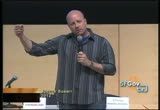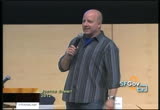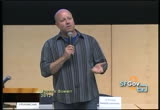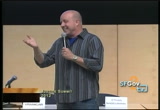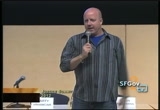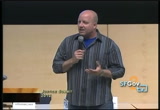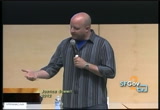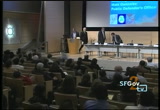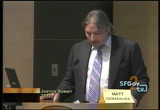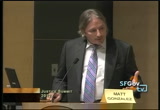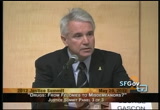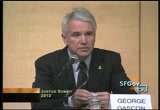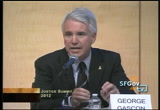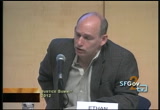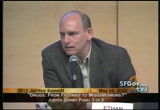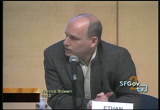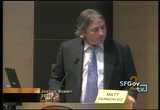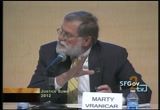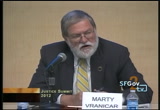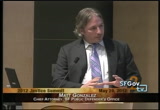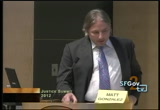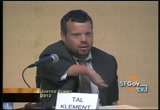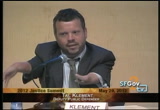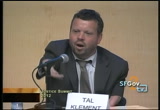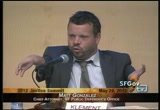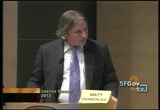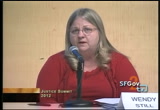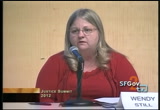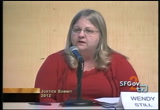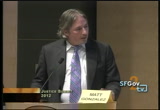tv [untitled] February 5, 2013 3:00am-3:30am PST
3:00 am
i owe people. that's why i go to talk to people. but my disease is first off wrong, theirs guaranteed wrong. made that way was i. first thought wrong, inappropriate, impolite, incorrect, cruel, criminal, abusive, petty, angry, poor, first thought wrong, absolutely. first thought wrong. 12 minutes, that's what i get? 12? second thought was i'll take two and make a difference. first thought wrong, sometimes second thought wrong grr! sometimes it takes me 15 minutes to get to a healthy thought. sometimes longer. sometimes four days of long, wrong, and strong. i went through t.s.a. recently in san jose where i live. i was born and raised in oakland, i went to jail in livermore. here is the part. normal people don't laugh at jail there. i worked there.
3:01 am
god bless you if you worked there. i couldn't do that job for two days in a row. i can do it for an hour. an ex-felon who is an extraordinary father. i can become an ex-drunk who is an exceptional citizen. there is a transition necessary for a convicted, afflicted person the and it involves payback. i owe so i go. but i'll tell the incarcerated, hey, if life was fair, you wouldn't be in here right now. you would have parents that cared and gave you the road map to success and they stuck around. they didn't hurt you on wait. they go yeah. if life was fair, you wouldn't have been busted when your partner wasn't. yeah. they love that one a lot. and then i'll say this well, if they locked you up for everything you really did do criminally, when would you get out? they don't like that one at all. so i'm blessed to be here for a brief period of time this afternoon and i'll tell you this, the first thought wrong is my problem. i was flying out of san jose
3:02 am
airport which i do about 200 times a year and i know everybody there. i have been flying out of there 15 years and the t.s.a. guy was new. new people hop. they don't stand still. new people. i don't care if it's a starbucks employee, which i love starbucks! i make my coffee like fudge. you have coffee with me in the morning, here, you want a piece? [laughter] well, that's good, isn't it? wow. normal people drink decaffeinated coffee. what the -- no, decaffeinated coffee. that's like a hooker who won't do it! can't call it that anymore, right? normal people don't clap for that, sir. [laughter] my first thought is wrong, i can't share it with you. that's how wrong it is. i'll move to the show i wrote. i go through security at t.s.a. and they hop, a hotel desk employee, a politician, they go
3:03 am
like this. economy of movement. that's their deal. traffic cop. been on the force a long time. new guy. the old veteran is going, dude, you'll wear out. it will take about two years and you'll want to retire. that's what happens. this t.s.a. kid, he's new, he goes like this. it's my turn to come through the metal detector, he's doing this. my first thought is that's a little overdone. this works. that's fine. i come through and i'm giggling, first thought wrong. it's quarter to 6:00 in the morning. something's funny? yeah. about i can't tell you what it is. he said, you've been selected for a special screening. i said, i've been chosen! you ever watch a homophobe's eyes roll back into his skull?
3:04 am
that mental reset of the computer just blinks. i need male assist on two, please. i need a male assist on two. i don't care. this disease doesn't care, the criminal justice system doesn't care. g.o.d. doesn't care, heterosexual, you're perfect, bisexual, you're greedy, life is a buffet for you every day. i'll take one of him, two of her and all that big fella, come on! barbecue in my back yard, let's go! so i step over to the special screening area and the kid comes over because the senior security guy says you go frisk him and he went -- first thought, wrong. i know i have leverage here. humor will make awkward turn into experience. now, the danger is humor is a bighammer. i'm not funny all day.
3:05 am
because at some point if all you have is a hammer, everything looks like a nail. it's the wrong tool for the right way to do something, so try to balance it. but i was out of sorts, hadn't had my coffee and was a little tired. he comes over and said i have to give you a special patdown with the back of my hand. i said use all 10 fingers, i'll buy you breakfast. checkpoint, security, two. i survived the situation, got on the plane. the point is this, that what's in my head i've never had to apologize for. first thought wrong properly filtered was some kind of rehabilitation or education or part of the c.o. or the p.d. or the d.a., helps first thought wrong become next right thing. you can do it. i can teach the incarcerated population what to want because
3:06 am
they always get what they wanted. they wanted more, they got more. they got it, they got it. they want someday, they left with none. they wanted her or him, they got that. i can tell them what to want now. pass first thought wrong, what to want. they do the right work, i can show them how to keep it this time. my boy's safe all day. it's not because of me. it's because of efforts like this. [applause] >> as our panelists take the stage and get seated, let me introduce our discussion. earlier this year, california state senator mark leno introduced legislation that would revise the penalty for simple drug possession under the state law, making drug
3:07 am
possession laws that punish as a felony would now be punished as a misdemeanor. the new legislation, sb-1506, does not apply to anybody involved in selling or manufacturing drugs. the stated purpose of the bill is that it would help alleviate overcrowding in state prisons and county jails, and ease pressure on california's court system and result in millions of dollars in annual savings for both state and local governments. senator mark leno who couldn't join us today as been quoted as saying, quote, there's been no evidence to suggest long prison sentences deter or limit people from abusing drugs. in fact, time behind bars and felony records often have horrible, unintended consequences for people trying to overcome addiction because they are unlikely to receive drug treatment in prison and have few job prospects and educational opportunities when they leave.
3:08 am
this legislation will help implement public safety realignment and protect our communities by reserving prison and jail space for more serious offenders. commenting on the fact 13 other states have moved in this direction, senator leno has said, quote, in fact, the experience of these other states when treating drug possession as a health issue has resulted in better public safety outcomes which can result in safer communities. george, why don't we start with you. you've dedicated post of your adult life to fighting crime and trying to make communities safer as the elected district attorney of san francisco, you've committed yourself to that, and yet you've broken away from the position held by, i believe, every other elected district attorney in california to support marar district attorney in califoia to support senator leno's direction. why is that? >> i want to thank marty for
3:09 am
being here. even though we disagree, i think it was really important to have the point of view of the 57 other elected d.a.'s in the state. i think it's important to understand in our dialogue so marty, thank you for being here. >> thank you. >> marty is someone i respect a great deal and he has been involved in public safety for a number of years and doing very momably serving the l.a. city attorney as well as his current position. actually, for me this has been a journey, it's not like a light switch went on yesterday. i have been involved in public safety for about 30 years. i have seen the war on drugs from the ground up. i have seen it as a police officer, young police officer walking, foot beat in south central and east l.a. i saw the revolving door, the impact that that revolving door was having in many communities and as i rose through the
3:10 am
ranks, i began to take a different look at the way we dealt with crime and the way we dealt with public safety and as i evolved throughout the years, i came to the conclusion that what we had been doing with the war on drugs was leading us in the wrong direction. the impact that it had and not only in communities -- quite frankly in our entire community was creating a situation which doesn't necessarily make us any safer and frankly, i think we have criminalized an area i think should be really looked upon as a health issue more than as a criminal issue, and i think consequently, a lot of the solutions we have tried in the last 2 1/2 decades have taken us to a place where today we cannot afford it economically. i can tell you that socially we have been broken for many years, but now the economic peace of it has come to play
3:11 am
and that's probably why, quite frankly, we are reacting. i think we can deal with being socially bankrupt much easier than we can deal with being economically bankrupt. i think now we've come to the point where there's an intersection between the two. having said that, i also think it's important to recognize simply taking people that are broken, because most of the people that have drug addictions are people that are broken, and just simply releasing them on to the streets or lowering the level of penalty without having services that recognize those people need a lot of help and that we have to be there in order to support them is not necessarily a good policy either and i think that could also create some serious problems for us. i am supporting 1506 because i believe it starts to take us in the right direction. i don't believe that 1506 is necessarily the destination. i see 1506 as the beginning of a journey that we all have to
3:12 am
embark together. when we start looking at drug addiction and the impacts of drug use as more of a health issue than as a criminal issue. having said that, i recognize we're not there yet and there's a lot of work that needs to be done. i believe 1506 begins to take us in that direction and why i'm supporting and why i'm here today. [applause] >> i'm wondering if you might be able to place this in a larger context for us, you heard george gascon's remarks. are they shared by folks in other states who have moved towards a similar type measure? >> there are a growing small but growing number of other district attorneys around the country in albany county, new york, in philadelphia, in atlanta, dallas, who are really beginning to break ranks with the broader d.a.'s associations and call for various types of reforms for the drug laws and drug enforcement. i think that the -- one of the
3:13 am
contexts that's so important here and people so often lose sight of is that this bill, 1506, is a small effort in the state of california and in the country of the united states to try to roll back the horrendous rates of incarceration that have happened in this country over the last 30 years. i mean, that's the context, right? the united states, i think most of you know these numbers now, but we're less than 5% of the world's population but almost 25% of the world's incarcerated population. we rank first in the world in the per capita incarceration of our fellow citizens. the russians are fading fast in second or third place together with the belarus people. the rates of the incarceration are five, six, seven, eight times than most in other societies, europe and elsewhere, though their rates of nonviolent crime and drug use are not that much different than ours. so if another country were to
3:14 am
lock up its own people at the rate that we do, and if our rates of incarceration were more normative to the rest of the world, we would regard with that other country was doing as a massive violation of human rights. that's the way we would look at it. now, the other point here is what we're doing is not even consistent with american history. i mean, we had 500,000 people behind bars in 1980 and now we have 2.3 million, 2.4 million people behind bars and almost have 5,000 people behind bars just for a drug violation. there are as many people behind bars for a drug violation than we had for everything in 1980. it's not consistent with global standards and not consistent with our own history. it's costing a vast amount of money and i think what you see is for some of the d.a.'s and others are beginning to say enough is enough. we're seeing prison populations beginning to decline but when it comes down to the question, who are the first people we should stop putting behind bars?
3:15 am
who is the people who really don't belong there? it's people whose only offense is possession of a substance to put in their own body, right? that's the first group that needs to be let out. [applause] >> marty, let me ask you, you're obviously part of the california district attorney's association, as we were talking before the panel began, you shared with me that your organization has previously supported a measure that mark leno brought forward to lower the punishment for possession of less than an ounce of marijuana to a misdemeanor to an infraction. in this case your organization is essentially opposed to it. what do you say to mr. adelman and mr. gascon? >> i think one of the things i want to point out is that in terms of the changes currently taking place in california's criminal justice system is that
3:16 am
we have embarked on a very, very large experiment and that's called realignment. prison population in california is going to approach by -- or sometime next year the federal mandate of 130,000. we've already released some 50,000 individuals to serve their time locally, and these offenses that we were talking about here are currently in the list of offenses that were to be served in county jails now. and if the notion here is to provide services and treatment to these individuals from a practical point of view, and i lean heavily on my experience as a misdemeanor prosecutor for all those years when we did
3:17 am
possession offenses, when we tried many, many under the influence offenses, especially heroin, i don't see that under the current system that reducing these penalties from felony to misdemeanor is going to have any incentive for this population to obtain treatment. i also do not agree that under this measure that locally there will be additional moneys available for treatment. i noticed in the list of supporters for senator leno's measure, it's heavily supported by people in the treatment community. i think that that's great because we all understand that treatment does work. treatment in these forms of addiction will help these people get on track because they are broken. i think there is a general
3:18 am
understanding among the prosecution community that that is the case, that treatment is the goal. but in my mind and in the minds of the majority of the d.a.'s around the state, the current state of misdemeanors and with our county jails being overcrowded, no person sentenced to a misdemeanor offense is going to do any jail time whatsoever. if they don't have jail as an incentive to engage in treatment, then there's nothing there, other than their own will to finally do something about their addiction. >> let me just ask you as a follow-up, what do you say, then, that the only thing -- if you're saying that currently being charged with a felony is going to result in drug treatment or maybe a sentence that isn't going to send someone to state prison, what do you say to someone that says well, what do you do with the felony conviction?
3:19 am
you're making a lot of felons out of people who are committing simple drug offenses. >> i think probably if you were to look at a lot of individuals who end up getting convicted of possession, the arrest charge was probably either possession for sales or sales case, and the individual took a deal for simple possession. i think that you still have the majority of those individuals who were incarcerated with state prison for possession either had strike priors, serious offenses, or they had pled down from a sales case. >> tal, let me ask you to respond to perhaps marty's point. you're a deputy public offender in san francisco and you've handled dozens of drug case, drug possession cases, you've
3:20 am
been -- a lot of people caught their attention when you were quoted in the press saying the way we handle drug enforcement here in california is in effect a war on crumbs instead of the often used phrase on drugs. how do you respond to his remarks? >> well, i think the first thing that we have to recognize is that the majority of people who are caught up in the criminal justice system and who are prosecuted for this type of offense for possession offenses and to some degree possession for sale offenses, the vast majority are indigent people and the vast majority of those indigent people are people of color. so what you have are two systems in place. you have a system where privileged white middle class people basically use drugs, college campuses, frat parties, not clubs, they use drug with
3:21 am
impunity, they don't have to worry about being caught. then you have a system that comes down like a ton of bricks on indigent poor people and that's one of the reasons why i think this type of reform is a positive first step because if you aren't going to make drug possession illegal, at least make it a misdemeanor and not a felony. at least don't stigmatize and label an entire population of people as felons and prevent them from getting housing, getting an education -- [applause] >> i guess the question is of fairness. you shouldn't have two systems, one where based on your race or class you can access treatment and move on with your life and another one where because of law enforcement tactics and focus, you end up caught up in a system where you can never move on. you're permanently trapped and weighed down by having a felony conviction.
3:22 am
the reason i call it a war on crumbs is the type of people we see at the hall of justice, i brought with me some props. i brought with me a sweetener packet. this is a gram of sweetener. most of the time this is on the high end of the amount of narcotics we see people in possession of. sometimes people have two or three sweetener packages on them and we call them drug dealers, you know. that's why we call it a war on crumbs because the amounts we are talking about are mine us schedule. -- minnesota us schedule. the fact -- are miniscule. and based on less than a packet of sweetener, to me is outrageous. and to me this is a positive first step, in my opinion, because at least you remove some of the stigma attached to this type of issue which in my opinion should be a public health issue.
3:23 am
it's a public health issue for a certain segment of the community and should be a public health community issue for everybody. [applause] >> tal, let me follow up and just say opponents of mark leno's measure would say it's not the amount of drug that somebody is in possession of, the fact that they're using drugs indicates they've got to find a way to supply themselves with ongoing, you know, sources of drugs or by taking the drugs, they're going to place themselves in a state that makes them more likely to commit crime. is this a valid argument? >> well, i think there are -- i think not everybody who uses drug is a drug addict. and there's a segment of the population that recreationally uses narcotics and don't necessarily need treatment and they certainly don't need a
3:24 am
felony conviction. that having been said, if you are an addict, it doesn't make any sense to turn you into a felon addict. we just heard that person before very eloquently talk about spending most of his life incarcerated. and he's made it. but the fact of the matter is, encumbrance of a felony conviction is so debilitating. countless of times you run into people who can't get housing, can't get education, can't get jobs, it's a trap. if we deal with addiction it makes no sense to turn an addict into a felon. [applause] >> chief, you've been committed to evidence-based practices in your administration of the adult probation department. to what extent does that inform your approach when you look at senator leno's measure and deciding whether or not to support it?
3:25 am
>> my view is not only from evidence-based practices but also from spending almost 30 years working in the california prison system, managing prisons, working in prisons, performing oversight, and what i know and what i can definitively say after 30 years is that prison does not address more change behavior. in fact, it actually, for those who do have addictions and illnesses, in fact it actually makes them worse. it's like sending individuals that have a sickness to criminal camp, they learn how to be better criminals but still don't get their addiction addressed. and the research out there tells us that incapacitation, period, does not change behavior. it also tells us that basically what changes behavior is approximate 200 hours of intensive treatment. and you do not have to go to prisoner jail in order to get those services, but yet we're
3:26 am
spending $56,000 a year, and in fact, overcrowded are prisons so much the supreme court had to weigh in basically and put a cap on the state prison system which still, their plan, they're working towards it but not getting there. realignment took us in a good direction in terms of trying to reduce the population that's going to state prison, but i think what 1506 does is it takes that next step to say we really need to look at a criminal justice system, you know, what we're doing, who we're sending into prison or to jail and what we're spending our money on. and evidence-based practices tells us that the majority of these individuals, they need treatment. and they need intensive treatment and they're more cost-effective and provides a better return on investment to the taxpayers to provide intensive services as well as then it reduces the victimization because you don't have addicts out there stealing
3:27 am
to support the habit and other subsequent crimes. and in addition to that, dealing with the addiction breaks the cycle of crime and breaks that inner generational cycle that exists, looking in prisons and managing them, i've seen generations of families come through the system. and it's because their behavior, their addictions have not been appropriately dealt with. and we researched, we've seen millions in the prison system researching substance abuse treatment. and what we know and what the research told us was the fact that it wasn't putting somebody in prison and it wasn't the amount of treatment in prisoner jail that changed the behavior, it was the treatment out in the community after that individual was released and had to deal with life stressors. so what evidence -- practices tells us is that there is a more effective way in which we can get a better return on our investment, 1506 is one of those strategies and it also
3:28 am
reduces victimization and breaks the cycle of crime so we don't have the next generation coming into the system. >> let me ask you this, it seems that over the years there's been an acceptance that somebody could be on probation and perhaps get caught when they give, let's say, urine tests or whatever is the requirement of their probation, but let's say a dirty test, testing positive for marijuana and slowly over the years it seems like the probation department gave that less importance. there was a time when that would have been treated as a violation, over time it hasn't been treated as a very serious violation. tal raised the issue about responsible drug use, and when we get into the area of heroin or cocaine or other drugs, are you seeing that there are some probationers that can in fact use these substances in a recreational manner and still
3:29 am
be otherwise law-abiding? >> well, first i'll say as an officer of the court, my job is to, of course, enforce the law, but with that said, i think what probation has realized, and not just san francisco probation, i think we're a very progressive leader, is the fact that there are underlying problems that are causing the drug usage. there is trauma out there. people talk about rehabilitating but in reality, for the majority of our clients, you know, they haven't been rehabilitated in the first place. the circumstances in which they grew up, the lack of parenting, the lack of role modeling, we talk about being disadvantaged which i completely agree with. all we have to do is take a look at the demographics of our adult population, 60% are african-americans. and, you know, that begins to tell the story. and so while
104 Views
IN COLLECTIONS
SFGTV2: San Francisco Government Television Television Archive
Television Archive  Television Archive News Search Service
Television Archive News Search Service 
Uploaded by TV Archive on

 Live Music Archive
Live Music Archive Librivox Free Audio
Librivox Free Audio Metropolitan Museum
Metropolitan Museum Cleveland Museum of Art
Cleveland Museum of Art Internet Arcade
Internet Arcade Console Living Room
Console Living Room Books to Borrow
Books to Borrow Open Library
Open Library TV News
TV News Understanding 9/11
Understanding 9/11